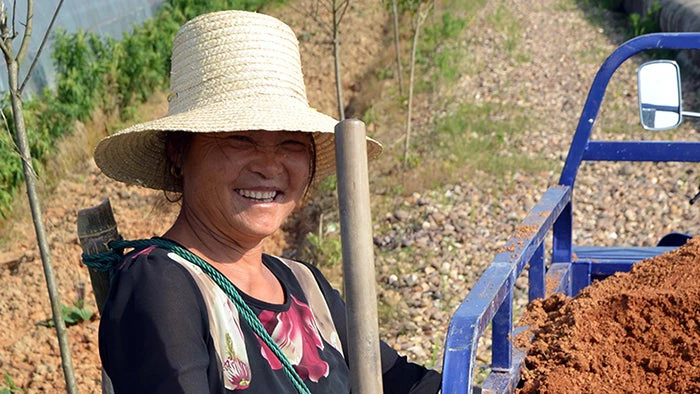
On a warm, rainy day in Shantian Village of Luo Fang Town in Jiangxi Province, farmer Liu Jian, along with five other locals, welcomed our World Bank mission team, including technical experts from the Investment Centre of the Food and Agriculture Organization (FAO), into his home.
All six have benefited from the Integrated Modern Agriculture Development Project (IMAD) Project since 2014, when implementation began by the County Office for Comprehensive Agriculture Development.
The project focuses on developing sustainable and climate-smart agriculture in six provinces across China. In Shantian Village, the project has funded new and improved irrigation systems, showcased farming practices that enrich the soil without the use of chemicals, introduced new crop varieties, and helped train farmers on how to increase crop yields while also protecting the environment.
One of the new practices introduced by the project is “no-tillage” seeding in rice paddies. “We were skeptical at first, so we each only tried it on a small amount of land,” farmer Liu Jian recalled, “Then we found it worked much better.”
Another farmer, Liu Daigeng, nodded in agreement: “It is less labor intensive, and the new crop varieties bring better yields and higher prices. We’ll still change the variety after a couple of years, but right now this [new variety] works best for us.”
Similar stories were told at another meeting with farmers from Hengdong County’s Evergreen Cooperative in Hunan Province, where the project helped them improve their irrigation and drainage systems. As a result, irrigation water has become more consistently available, and farmers could better plan their crops.
At a nearby vegetable cooperative, the project helped set up a cold storage facility to help preserve produce and provided training on how to better market, package, and add value to the peppers that the farmers were selling.
In the Shanzhang Town of Hengdong County, the project helped the Gifu Water Users’ Association construct a new canal and buy pump and other irrigation and drainage infrastructure. It also helped train farmers on how to manage and preserve the village’s water system. This investment benefited 97 percent of the households in the area, who previously had no consistent access to irrigation water due to broken canals and changes in weather patterns. Farmers have also begun adopting climate smart practices like alternate wetting and drying for rice paddies, which reduces emissions of greenhouse gases.
Our World Bank mission team, with technical assistance from the FAO Investment Centre, also held a three-day National Workshop on Sustainable and Climate-Smart Agriculture for 110 participants, including project management staff, engineering design contractors, and monitoring and evaluation specialists in Chongqing Municipality.
Our subsequent field visits to Kaixian, Hengdong, and Yushui show that the IMAD Project has helped improve farmers’ resilience to climate change through improved irrigation systems and climate smart technologies and practices. As 66-year-old Liu Binghau from Shantian Village said, “It’s good to be part of the project.”



Join the Conversation